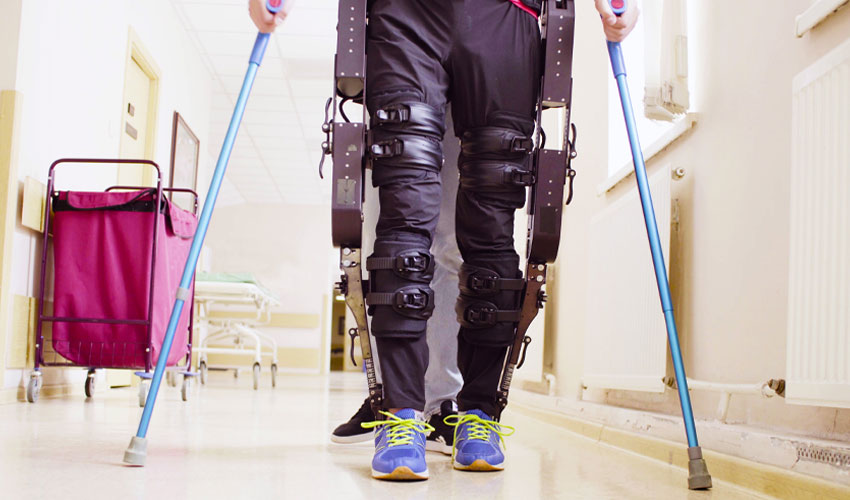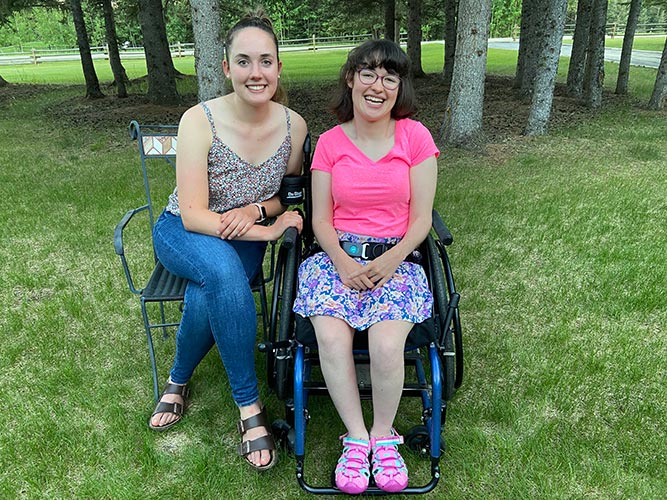'The neatest thing in the world'
Student’s award-winning research into exoskeletons inspired by sister

An exoskeleton suit, or robotic suit, is a type of assistive technology that a person with a disability can wear over their clothes.
“I have always been interested in exoskeletons,” explains recent Mount Royal graduate Katrina Mertens, whose triplet sister Alex has cerebral palsy. From a young age, Mertens was immersed in a community of families caring for children with disabilities.
“I really developed a passion for wanting to improve their lives and for technology. Exoskeletons are something I came across in Grade 10 and thought ‘that’s the neatest thing in the world.’ ”
What is an exoskeleton?
An exoskeleton suit, or robotic suit, is a type of assistive technology that a person with a disability can wear over their clothes. Made of up connected wires, cables and other flexible moving parts, exoskeletons include mechanical braces for the torso, arms and legs. They are controlled by a backpack computer that responds to sensors on the exoskeleton’s leg fittings. A form of physical therapy, exoskeletons can improve walking posture and gait. They can sometimes be an alternative to corrective surgeries.
The suit trains the body to move by sending signals between the brain and the muscles. The backpack computer responds to sensors on the exoskeleton to trigger muscle movement. The amount of assistance given to the wearer can be adjusted based on the person’s needs — to activate the muscles but still allow some independent control over movement.
For her honours thesis, entitled “Taking Exoskeletons to Market: a Case Study of the Commercialization Process,” Mertens researched a Canadian startup that designs and sells robotic leg suits for children with disabilities. Her research won the Bissett Honours Thesis Award at the 2021 Research and Scholarship Days.
Mertens, who graduated in June with a Bachelor of Business Administration and major in finance, says Mount Royal gave her the flexibility she needed to pursue a passion project. “The great thing about Mount Royal’s honours program is I didn’t have to write a thesis only about finance. My minor is in innovation and entrepreneurship so I was able to write something I’m really passionate about.”

Katrina Mertens, left, with her sister Alex, also a student at MRU.
Associate professor of entrepreneurship Dr. Simon Raby, PhD, supervised Mertens’s research and says the 12-month project was ambitious and successfully executed.
“When it comes to innovation, the majority of research is often statistical in nature. A survey with a large number of companies tells you what those companies are doing with innovation. But it doesn’t tell you how they’re doing it or why they’re doing it,” he says. “Katie’s work dug deeper because it was a detailed case study. From her interviews within the company she was able to distill how that innovation had been taken to market. It’s a very rich piece of research.”
Mertens’s project was also unique in that it took a deep dive into a small company, whereas most of the available data is based on large companies. The data Mertens obtained is hard to access at the best of times, let alone during a pandemic, Raby notes. It generated practical, not theoretical, findings, including tips for other startups.
“Katie wanted to understand how innovation worked in practice, and what were the enablers and inhibitors of the innovation process for this particular company in taking this exoskeleton to market. This gives nuanced insight, through a qualitative approach, to innovation in a small firm.”
How exoskeletons can be more cost-effective in the marketplace is definitely an outcome Mertens is hoping for. “A huge barrier (for families) is the cost and lack of funding for exoskeletons. They’re extremely expensive and currently there’s no real funding for these devices because they’re not considered a necessity the way a wheelchair is.” Exoskeletons for adults range in price from US$30,000 to US$150,000.
“This (research) could bring light to how life-changing these devices are for these families and adults,” she says. “But making them more affordable is huge. I hope my research can bring light to the good they can do and that this is where our society is going, too, with technology.”
Now that she’s graduated, Mertens is weighing her job options and hopes to land something with a startup. She says being able to apply her research findings in that sector would be ideal.
“I found that I really love research. I was so thrilled to have that opportunity through Mount Royal.”
Learn how Mount Royal’s Institute for Innovation and Entrepreneurship is developing high-impact talent. Explore majors and minors and student life in the Bissett School of Business.
June 28, 2021 — Melissa Rolfe
Media request contact information.
Have a story idea? Please fill out this form.

